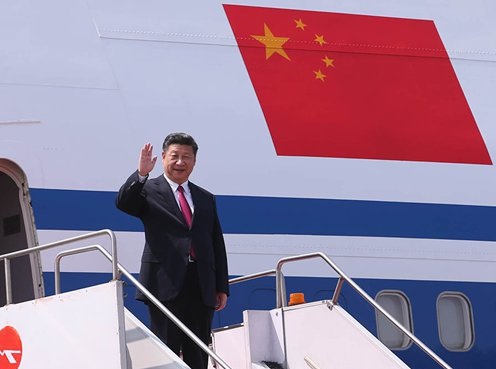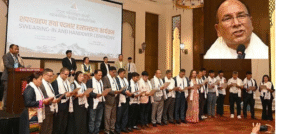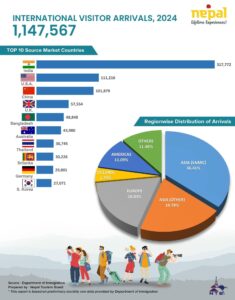Chinese President Xi Jinping to visit India , Nepal

By Yang Sheng in Beijing and Cao Siqi in Chennai —-
Chinese President Xi Jinping is scheduled to visit India for a second informal meeting with Indian Prime Minister Narendra Modi from Friday to Saturday ( October 11 -12 ) .
Chinese experts noted the visit will further improve China’s ties with South Asian country and also serve as a response to the US Indo-Pacific strategy intended to contain China.
After the trip to India, Xi will also pay a state visit to Nepal on Sunday, Foreign Ministry Spokesperson Hua Chunying announced Wednesday at a press conference in Beijing. This is the first state visit by a Chinese president to Nepal in 23 years.
Hua noted the trip to the two countries will be the first major diplomatic event since the 70th anniversary of the founding of the People’s Republic of China.
Xi’s informal meeting with Modi at the coastal city of Chennai is slated for Friday. This informal summit is expected to have a significant impact on bilateral ties and extend the relaxed and friendly atmosphere of the 2018 meeting in Wuhan, said Chinese Vice Foreign Minister Luo Zhaohui.
Xi and Modi will communicate on “strategic issues,” set the tone and guide the direction for the development of China-India relations, Luo said, “to speak out with united voice from China and India to the world, to provide stability to an uncertain world.”
With protectionism and unilateralism on the rise, two countries are both conducting deep reforms, Luo said.
He added that free trade and economic globalization are developing against difficulties, meaning that cooperation and communication between the two largest developing nations, as well as the only two countries with more than 1 billion populations in the world, are truly important.
Chinese experts noted that Xi’s trip could also lay a new basis for future bilateral ties and mount an effective response to the US Indo-Pacific strategy intended to muster Indian support in the regional containment of China.
Hu Zhiyong, a research fellow at the Institute of International Relations of the Shanghai Academy of Social Sciences, told the Global Times that although the US is trying to rope in India in its Indo-Pacific strategy, Modi understands that Washington just wants to use New Delhi and “won’t give India too many actual benefits on trade and economic issues.”
Li Li, director of center for South Asian studies at Tsinghua University, said that India is just like many other countries which don’t want to see a new cold war between China and the US and so it won’t totally lean to one side.
Picking Chennai as the venue for meeting has strategic and economic reasons. Satyendra Kumar Upadhyay, director of International Relations with the Mumbai-based Somaiya Vidyavihar University, told the Global Times that Chennai is nicknamed the “Detroit of Asia,” and is capital of the South Indian state of Tamil Nadu.
There are about 12 to 15 Chinese companies such as Lenovo and Huawei operating in Tamil Nadu and the number is expected to increase.
Wuhan meeting legacy
Xi and Modi had an informal meeting in the city of Wuhan, capital of central China’s Hubei Province, on April 27-28, 2018, which repaired bilateral ties after a 2017 military border standoff in Doklam. Xi said at the meeting that mutual trust was the basis for stable development of China-India relations.
Answering the question about alleged India’s ongoing military exercise at the “disputed eastern sector” of China-India border and if that will impact the Xi-Modi meeting and the bilateral ties of the two nations, Luo said the report was not true so China has nothing to worry about.
“The region you mentioned is a sensitive region and we don’t want to hear such a thing,” Luo answered.
Swaran Singh, a professor at the School of International Studies at the New Delhi-based Jawaharlal Nehru University, told the Global Times that the Wuhan meeting achieved two breakthroughs: First, the two leaders provided a strategic direction to their forces to ensure peace and tranquility on their disputed borders and second, the “2+1 model” where China and India cooperate with a third party.
“This model was an innovative offer to get India to join China’s infrastructure building across Asia,” he said.
India, which has been reluctant to participate in China-initiated Belt and Road Initiative (BRI), was offered treatment on an equal footing to launch third-country projects, Singh noted.
“The first instance of this saw China and India providing joint training to Afghan diplomats in August last year.”
Asked whether China and India will have any further bilateral or multilateral cooperation in regions or countries like Afghanistan, Luo said that China and India will not rule out any possibility of cooperation in any region of the world.
Nepal visit
Xi will visit Nepal on Sunday. Luo said at the briefing that the visit will make the leaders of the two countries start a new era for the fast development of the China-Nepal relationship and promote the joint construction of the Belt and Road while speeding up the construction of cross-Himalayan transportation.
Hu said China will push forward with railway cooperation to connect Nepal with China’s Tibet and create more opportunities for Tibet as well as boosting the economic growth of the region.
On Wednesday, two days ahead of his trip to India, Xi met Pakistani Prime Minister Imran Khan at the Diaoyutai State Guesthouse in Beijing.
Xi said at the meeting that China was ready to work with Pakistan to forge a closer China-Pakistan community of shared future in the new era.
Noting that China and Pakistan are all-weather strategic cooperative partners, Xi said no matter how the international and regional situation changes, the friendship between China and Pakistan has always been unbreakable and rock-solid, and China-Pakistan cooperation has always maintained strong vitality.
Currently, tensions are intense between Pakistan and India over Kashmir.
Chinese experts noted that Xi’s informal meeting with Modi could be a chance for China to help Pakistan and India to resolve the crisis peacefully.
October 9 , 2019 Source:Global Times
Photo: Xinhua
















